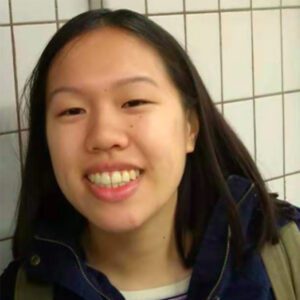Margaret Cai is a Chemical Engineering and Biochemistry Major. She is graduating in the Class of 2022.
Why did you decide to study Chemical Engineering and Biochemistry at Northeastern?
“I’ve always been very interested in biology and chemistry. When I was younger, I read books about diseases just because I found them fascinating. I chose Northeastern because it is a relatively large school in a city that I’ve always wanted to go to as a kid growing up in New Hampshire.
Originally, I considered pursuing a degree in Chemical Engineering, but I imagined It as a 
traditional oil and gas industry which is not what I wanted to pursue in my scholastic or professional career. Alternatively, I came to Northeastern as a Biochemistry major and as I started taking classes for my Biochemistry major, I realized there were many problem-solving aspects that I thought could be strengthened as a Chemical Engineering major. I had been advised in high school that chemical engineering was practical for industry research and this thought process ultimately led me to pursue a combined major because I could pursue both large-scale engineering and small-scale scientific research. I was always interested in biotech pharmaceuticals so I believed that the combined Biochemistry and Chemical Engineering major offered a broader prospective of how to scale out biotech processes, therapeutics, and other molecules that help patients.”
You recently received the Joel Goldenberg Memorial Scholarship. How do you feel about this award recognizing your academic achievements?
“I am honored and very grateful to the ISPE Boston Area Chapter for this scholarship. ISPE, the International Society for Pharmaceutical Engineering, is a valuable resource to anyone in the biotech or pharmaceutical industries. As someone who plans to work in drug development, I’m glad to have a place where I can meet and talk to other people in the industry. Receiving this scholarship has encouraged me to continue pursuing a career in biotech, a field that I enjoy working in.”
Would you tell me about your research with Penny Beuning? How did you first become involved?
“Penny does a lot of research with DNA damage and how mutations affect the function of protein and is famous among students for providing undergraduates the opportunity to assist her with projects. I had done some research my spring semester freshman year to explore what professors were working on at the university and was familiar with Penny’s DNA damage cancer research. She partnered me with her graduate student Samantha Watson who was already working on the project as her assistant. At the time I entered, her project was focused on a protein called OTC and OTC deficiencies which are a result of miscoded and misfolded proteins that result in many serious conditions or death in children. In the lab I assisted with research that mutated immune acids in the protein one at a time to see the effect on the protein function.”
What other research or co-ops have you completed in your time at Northeastern?
“I’ve completed two co-ops thus far. My first co-op at ENKO Chem was a venture capital company that conducted agricultural research looking at regions of the planet susceptible to chemical binding. ENKO Chem is trying to determine herbicide targets because currently there are many weeds that are herbicide resistant that can be detrimental to agriculture and future health. In other words, they are trying to find potential herbicides that prevent the weeds from overtaking the field. As a co-op, I worked in the molecular biology department analyzing how compounds bound proteins and also did some computational work to model proteins virtually. I completed my second co-op at TG Therapeutics, also a venture capital company. At my time there I helped with a lot of the FDA approval paperwork and statistical analysis.”
What extracurriculars or student organizations have you taken part in at Northeastern?
“In the spring of my sophomore year, I started attending meetings for the American Institute of Chemical Engineers (AIChE). I joined two of their boards: the Professional Relations Committee and the Events Committee. We spent a majority of the fall and spring semester last year preparing for AIChE’s annual regional conference to be held at Northeastern, but it was unfortunately postponed to a virtual format later in the year as a result of the COVID-19 pandemic. In addition to working with the student organization, I’ve helped organize career fairs, such as volunteering at the BMES/AIChE career fair for co-ops where I helped the employers settle in. Finally, I am involved with the International Society for Pharmaceutical Engineering (ISPE) that is comprised of a group of students specifically focused on the pharma industry and pharmaceutical engineering where I worked as the treasurer and events coordinator last year and helped organize speaker events.”
What are your plans after degree completion?
“After I graduate, I intend to work for several years and attend graduate school with the hopes of attaining a PhD.”

